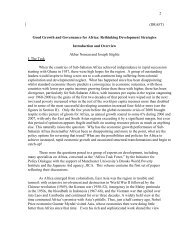THERE WILL BE INK - Initiative for Policy Dialogue
THERE WILL BE INK - Initiative for Policy Dialogue
THERE WILL BE INK - Initiative for Policy Dialogue
You also want an ePaper? Increase the reach of your titles
YUMPU automatically turns print PDFs into web optimized ePapers that Google loves.
However, given that the curriculum is reviewed every two years, according to Nwuneli, there willcertainly be an opportunity <strong>for</strong> altering the curriculum in a business and economic reportingdirection.Three examples of available undergraduate degrees at universities in Lagos reveal the current lack ofopportunity <strong>for</strong> journalism students to have <strong>for</strong>mal training in business and economic reporting. Forexample, in UNIZIK’s mass communications department, a student can earn a Bachelor’s of Sciencein mass communications, but has no opportunity within the available curriculum to take a coursespecifically on business and economic reporting. They have four options within the degree to gainsuch experience. One, students can take it upon themselves to study business and economicreporting through the research project they are required to do in their fourth year. Two, students canbe placed with a business desk in their required two-month internship. Three, students can opt <strong>for</strong>the course Specialized Reporting that mixes reporting on the economy with other topics such asagriculture, medicine, religion, sports, and science and technology reporting. Four, students can electthe course Economic Problems of Nigeria.According to Professor Nwuneli, it is difficult to gain business and economic reporting training inundergrad but such training could be part of graduate work. Un<strong>for</strong>tunately, journalists wishing totake a class in extractives would not have an opportunity to do so at UNIZIK. This lack of businessand economic training Nwuneli attributed to all undergraduate schools in Nigeria. He said, “Ifyou’ve seen one, you’ve seen them all.” He said he is writing the curriculum <strong>for</strong> their graduateprogram now, and that he could add more business and economic reporting to the curriculum,though he admitted that it hadn’t previously occurred to him to do so.In Nwuneli’s estimation, UNIZIK graduates 15 to 20 students per year with a Masters of Science inMass Communications, and 6 to 8 students per year with a PhD. Neither their one-year MSc, northeir PhD offer dedicated coursework <strong>for</strong> business and economic reporting, this topic may bestudied at the student’s discretion in his or her required Dissertation.Unilag is another Nigerian university that offers degrees in mass communications. The head of theMass Communications department, Ralph Akinfeyele, boasts that his department has produced over90 percent of media practitioners and trainers in Nigeria. According to Akinfeyele, there areopportunities to study business and economic reporting in their undergraduate program, withrequired classes including Reporting the Economy and Science and Technology Reporting. ForReporting the Economy, they mix theory and practice, assigning students to beats including banks,the stock exchange, and insurance companies. They invite bankers and business people to letstudents hear “from the horse’s mouth.” In the third year, students choose one of these tracks:print journalism, advertising/PR, and broadcast. Advertising/PR is the largest track, and has grownin popularity in recent years. Unilag was named a center of excellence by UNESCO, the first inAfrica. However, <strong>for</strong> journalists wishing to study extractive industries, it appears that there are noclasses available in this area.The third, and perhaps most significant, example of a university presenting coursework in businessand economic reporting is the School of Media and Communication (SMC) at Pan-AfricanUniversity, which also houses the Lagos Business School. SMC was founded in July 2008, whichmeans it is a very new player in Nigerian mass communications. They offer a Master of Science inMedia Communication, with a class size of approximately 25, shorter seminars and workshops, and– 94 –














